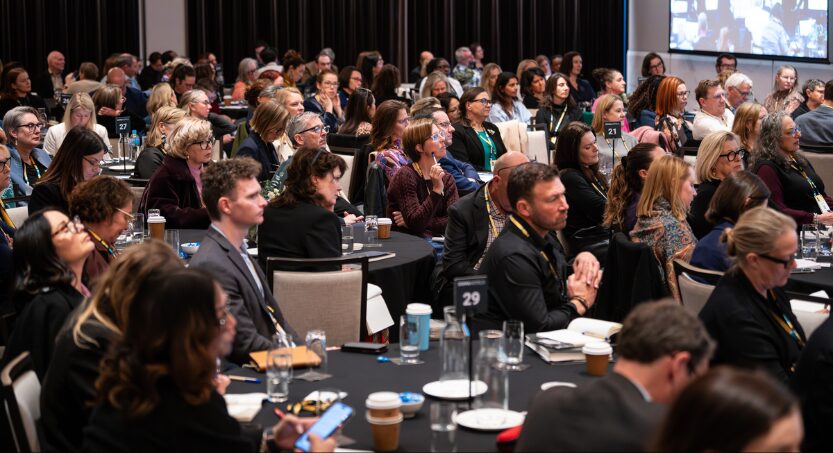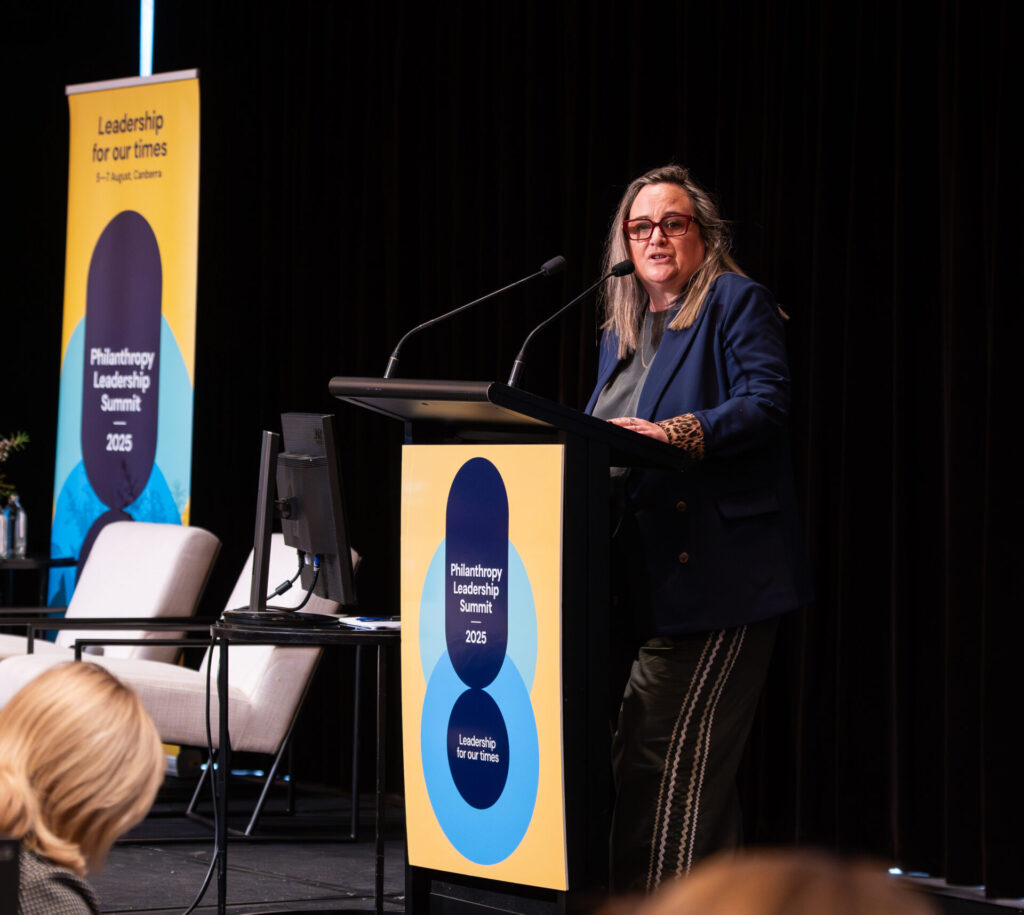Philanthropy Leadership Summit 2025: ‘People have appreciated the honesty of the speakers’

The feedback was clear and consistent. This year’s Philanthropy Australia Canberra summit took a refreshing direction that felt inclusive, open and a rich exchange of ideas. The tone was set early ‘to push each other hard in conversations’ and a focus on sharing personal stories struck a chord. Delegates came away feeling galvanised and energised about the sector’s unique position to play an important role in addressing the polycrisis.
More than 450 delegates from across the sector gathered in the national capital for an extensive program of discussions aimed at unpacking and understanding how philanthropy, the for-purpose sector, civil society and government can work together differently to tackle the interconnected challenges facing the world.
The main summit event was kicked off by globally renowned complex systems expert, Canadian Professor Thomas Homer-Dixon, who unpacked the polycrisis. The polycrisis is increasingly described by commentators as a convergence of climate and technological disruption, geopolitical instability, economic inequality and democratic fragility challenges that are amplifying one another and creating an era of unprecedented complexity and risk.

The Leadership Summit was held under the Chatham House rule to provide a candid space for speakers to share their personal experiences of leadership and discuss new ways of working together. Maree Sidey, Philanthropy Australia CEO, said during a break in the sessions: “I feel so energised. We’ve had fabulous feedback from people. They’re appreciating the rawness, honesty, humility and authenticity of the speakers.
“The speakers have really responded to the brief to bring their own personal stories and to challenge the delegates about what leadership means now.”
At the end of the main day’s program, a panel of sector leaders reflected on their key takeaways and themes. The need for philanthropy to engage more with AI to help achieve complex systems change was raised and Professor Homer-Dixon’s message that hope was an essential ingredient in facing the world’s challenges was echoed. The speaker said it was important to keep seeking new partnerships and collaborations with values-aligned change-makers who have a shared vision of a positive future.
Another speaker said the discussions had made her reflect that the polycrisis placed an increased sense of consequence on philanthropy’s impact. She said it was incumbent on the sector to do more with its with resources, connections and influence – that the times called for mass leadership rather than leadership among the few.
The difference that sharing personal stories had made to the discussions was highlighted by another speaker again as a sign of strong leadership. “The personal is political, the personal is philanthropic. There’s been a lot of vulnerability,” he said. The gathering felt like a “generative community of people really trying to figure it out”.
One of the thorny questions for all Australians was raised which is where our wealth comes from and the truth-telling that is necessary for our healing and walking together with our First Nations people. Delegates were also urged to think about what it takes to invest in long-term funding for advancement over many generations and to engage in re-education so that we all understand how to work better in allyship.
The need for emotional skills to be a central requirement in leading for our times was another theme that many were surprised but heartened to see emerge and it became a recurring topic of conversation. Possibly the most repeated call to action was the need to “fund the glue” more in communities – the connecting organisations and groups around a program to create the best circumstances for it to succeed.
Thanks to support from its members, partners, Board and staff, 80 scholarships to attend the conference were made available this year to for-purpose and other leaders in a cross-section of roles who would not have been able to attend otherwise. This meant that it was likely the most diverse audience that the Canberra Summit has ever hosted.
Krystian Seibert, Philanthropy Australia’s Executive Director of Policy and Sector Development, reflected on how the conversations about advocacy have evolved significantly in the 10 years since the Canberra summits began. “It’s really pleasing to look back on that and hear the conversations that we’re having now.
“My hope is that the personal stories of leadership that are being shared will prompt our movement, our members, partners and others to think about what we can do differently now if we really want to take philanthropy to the next level in terms of its support for leadership in Australia.
“It’s essential, given the polycrisis and all the challenges we’re facing. Philanthropy has a key role in supporting responses to that.”
Prior to the summit, it was standing room only at the National Press Club where around 270 guests were treated to a powerful address by the Hon. Julia Gillard AC that set the tone for the coming days. The former prime minister is Founder and Chair of the Global Institute for Women’s Leadership and Chair of one of the biggest philanthropic foundations in the world, the Wellcome Trust in London, with a £37bn (A$76bn) endowment.
Philanthropy Australia would like to thank Georgina Byron AM, of the Snow Foundation and Michelle Steele, Chief First Nations Officer at the Paul Ramsay Foundation, for doing a marvellous job as MCs. Other speakers at the event included Hugh de Kretser (Australian Human Rights Commission), Carol Schwartz AO (Trawalla Foundation), Dr Rebecca Huntley (89DegreesEast), Dr Cassandra Goldie AO (ACOSS), Anjali Sharma (teen climate activist), Anna Brown OAM (Equality Australia) and Associate Professor Bhiamie Williamson (Monash University).
A huge thanks to all Summit partners: our diversity and representation funder: The Equity Trustees Equity & Empowerment program; our major partners: Perpetual and Gandel Foundation; our supporting partners: Menzies Leadership Foundation, The Ross Trust, The Bryan Foundation, The Paul Ramsay Foundation, Mannifera, Reichstein Foundation, The Snow Foundation, Vincent Fairfax Family Foundation, Nunn Dimos Foundation, Judith Neilson Foundation, Sidney Myer Fund, Rendere Environmental Trust and our program partners: Australian Indigenous Governance Institute, the ResourceFULL Collective: International Women’s Development Agency, Pacific Feminist Fund & Urgent Action Fund, Asia & Pacific, the Minderoo Foundation, Community Foundations Australia, Global Philanthropy Project, Australians Investing in Women, She Gives, Australian International Development Network, Australian Environmental Grantmakers Network, Australian Progress.
Read a Q&A with Professor Thomas Homer-Dixon on the polycrisis and view an image gallery of the summit on the Philanthropy Australia website. Read Giving News next week for more on the Philanthropy Leadership Summit 2025.